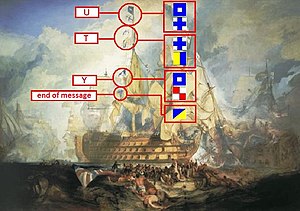
"England expects that every man will do his duty" was a signal sent by Vice-Admiral of the Royal Navy Horatio Nelson, 1st Viscount Nelson from his flagship HMS Victory as the Battle of Trafalgar was about to commence on 21 October 1805.
During the battle, as Nelson's fleet closed in on the allied fleet, he ordered Lieutenant John Pasco to signal the British fleet as soon as possible. After Pasco suggested some changes, and Nelson agreeing to them, the signal was sent at around 11:45 a.m. on 21 October 1805 and relayed using a numeric flag code known as the "Telegraphic Signals of Marine Vocabulary".
Although there was much confusion surrounding the precise wording of the signal in the aftermath of the battle, the significance of the victory and Nelson's death during the battle led to the phrase becoming a standard representation of a militant English spirit of courage and virtue in the face of conflict. It has been regularly quoted, paraphrased and referenced up to the modern day.[1]
- ^ Daniel Mandel (December 2005). "The "secret" history of the Anglosphere" (PDF). IPA Review. Archived from the original (PDF) on 3 December 2007. Retrieved 17 September 2006.